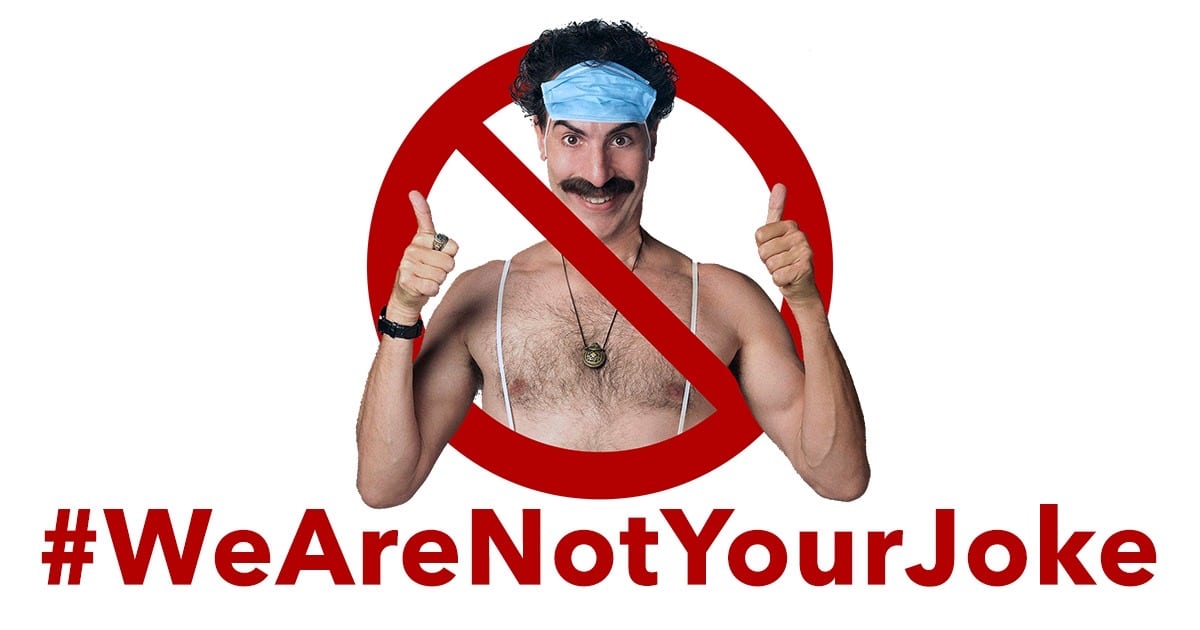ELLA KELLEHER WRITES — Sacha Baron Cohen’s sequel, Borat Subsequent Moviefilm: Delivery of Prodigious Bribe to American Regime for Make Benefit Once Glorious Nation of Kazakhstan (2020), has sparked outrage and controversy among the Kazakh community online, which argues that the movie promotes an ugly portrayal of its native country. The mockumentary, directed by Jason Woliner and released last Friday on Amazon Prime, garnered more than “100,000 people [who] signed an online petition to cancel the film,” creating the #CancelBorat movement on various social media platforms. Shortly after, a new hashtag was born: #WeAreNotYourJoke, promoted by prominent Kazakh social media figures, which then sparked heated reactions on Instagram, Twitter, and Facebook.
Why all the outrage? To start, Cohen’s PR team created fake Instagram and Twitter accounts in which users impersonated the Kazakh government before the release of the sequel. Tweets ranged from insults of U.S. officials like Vice President Mike Pence to aggressive slandering of Uzbekistan, which borders Kazakhstan and shares the same ethnic Turkic ancestry. Here’s an example of one of their tweets:

Needless to say, the Kazakh people have had enough of Cohen’s so-called ‘comedic satire.’ The press office of the Kazakh prime minister, Askar Mamin, denied the legitimacy of the Twitter account but the Kazakh government has refused to make any official comments about the sequel after doing so with release of the first Borat film in 2006. This silence is precisely why the Kazakh community has decided to share grievances online and explain the personally harmful nature of both of Cohen’s films.
Here’s what some Kazakhs had to say in a viral Instagram post created by Kazakh artist Erden Zikibay, which was listed under the hashtag #WeAreNotYourJoke:

- “[She said] that’s not a real place… that’s that fake country from the movie Borat.”
- “My little daughter was seven years old when the first [Borat] movie came out, and she was severely bullied at school because of this film.”
- “[He said] to me, ‘you know I did not expect a pretty Asian lady [to] walk [in] and say she’s from Kazakhstan.”
- “[Men would ask] are all Kazakh women prostitutes?”Kazakh women face the worst Borat-derived abuse. As well-known Kazakh filmmaker Gia Noortas explains in a podcast, “[she] feels as if she’s[being cornered by a bunch of bullies and they are telling [her] to enjoy it.” Other Kazakh women recall how they were “treated as the sluttish nitwits of Borat’s entourage.” The hour-long podcast features both Kazakh and Western participants who claim harassment due to Cohen’s Borat films.
Although Cohen claims he chose Kazakhstan randomly, to mock the current American government and its supporters, the fact remains that many foreigners continue to laugh and ridicule the Kazakhs and believe that both Borat films reflect reality. Remember, though, that the Republic of Kazakhstan is less than 30 years old and has suffered from a rather bitter and tragic colonial past; Russia has occupied Kazakh territory since the mid-19th century, forcing its citizens to speak Russian and adopt Russified surnames. As a result, Kazakhstan remains a near-complete enigma to the West, making it an easy target for Western filmmakers like Cohen.
The original Borat (2006) and its sequel whitewash the image of ethnic Kazakhs, making them appear as though they are all Russian-speaking Eastern Europeans. Actually, ethnic Kazakhs are indigenous Central Asians who primarily speak their own native tongue, Kazakh. The sequel also promotes various fake cultural customs and traditions, such as the ‘fertility dance,’ in which Borat Sagdiyev’s daughter exposes her genitals before a Western audience, implying that such practices are common in Kazakhstan. Essentially, the film erases the actual culture and traditions of the Kazakh people, replacing them with offensive, sexist ones.
Amazingly, Cohen insists that he is trying to target prejudice. He even has a campaign called #StopHateForProfit. British journalist Edward Lucas of The Times, though, writes that, “[it] is easy for [Sacha Baron Cohen] to say this from his hugely privileged position. Kazakhs are defenseless. Most outsiders would struggle to find their country [on a map].”
What’s more, there are ideological similarities between Cohen’s portrayal of ethnic Kazakhs and the horrific history of minstrel shows, a racist American form of entertainment popularized in the early 19th century. Those shows capitalized on the American people’s racist impressions of African Americans by accentuating cultural myths, with performers appearing in blackface. Minstrel shows, of course, stemmed from slavery.
Finally, one of the foundational elements of the Borat Sagdiyev character is overt anti-Semitism, which makes Westerners assume that Kazakhstan is an anti-Semitic country with a history of persecuting Jews. This is far from the truth.
Is the new “Borat” movie funny? To many, yes. But maybe in the not-so-distant future, we will look back on both such Cohen films and wonder why there was not more outrage over the misrepresentation of Kazakh people.


Great and very insightful article
Thank you for the detailed analysis. Very helpful
This is amazingly well written and eye-opening. Thank you. The third to last paragraph really hits the point perfectly.